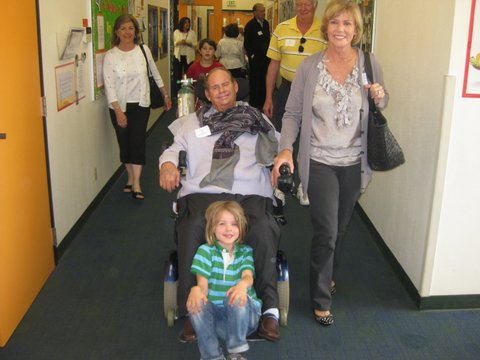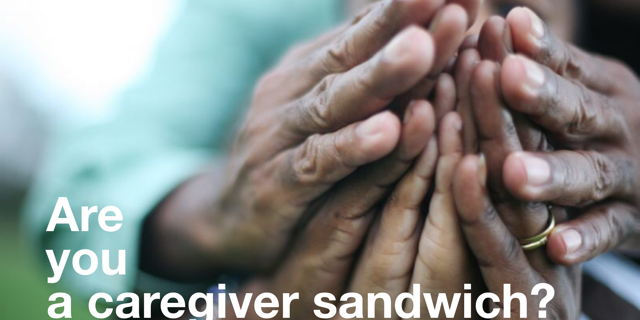As the summer comes to a close and the school year revs up, one category of caregivers faces unique challenges: Caregivers with Children. Are you a caregiver sandwich? Caring for both an ailing parent and your children puts you smack in the middle!
While the school year may provide parents a break during school hours, the after-school demands of homework and activities can add to their burdens. Providing care to both growing children and ailing parents can become a non-stop task that fills every moment of one’s day.
On the other hand, there can be benefits. Many children enjoy the extra opportunities to connect with their grandparents and become closer to them during these trying times. This can also be an education in patience and compassion they might not otherwise have as children. I know my grandchildren benefited from the experiences they had with their grandfather. If age appropriate, they may even help by hanging out with grandpa while mom goes on errands. Yet, no matter how helpful a child or grandparent may be, the challenges for the responsible parent are often immense.

While every family dynamic is different and some can be particularly hard, doubling one’s responsibilities inevitably requires a similar doubling of support for the caregiver, and, unfortunately, caregivers are notoriously resistant to reaching out for help. Yet, when you have children who need you as much as an aging or disabled relative does, somehow support has to be found so you can be present as both a caregiving and a parent.
So what to do? The advice for caregivers remains consistent: seek support, accept help, take adequate breaks, and, in general, take care of your physical, mental, and emotional needs, or you won’t be able to adequately provide care. For caregivers simultaneously raising children, this is even more vital. If you don’t take care of yourself, you’re not the only one who suffers; your children do too as does the loved one you’re helping. Both sides of the sandwich suffer.
How can you manage it when pulled in multiple directions by people you love dearly? Here are some ideas to consider:
1. Accept Reality
Sometimes this is the hardest step. It’s hard to see a parent’s health deteriorate, and yet, if that’s the reality, this deterioration will likely continue over time until the parent’s death. Simultaneously, your child is growing rapidly and will eventually launch into the world. That child has needs, your ailing parent has needs, and you have needs. Writing down those needs can help you see them clearly and also provide ideas for helping to manage them.
2. Clone Yourself
While you technically can’t clone yourself, you can find people who can clone what you do. They can help your parent bathe or eat; they can help your child with the same tasks. They can drive your child to school, while you drive your parent to the doctor. These people can be family or friends, or they can be paid caregivers. They can be community volunteers. It’s essential to reach out and find some people who can clone what you do as you can’t do it all alone. You’ll be surprised how many want to help if you ask.
3. Start Early
Often, people wait until they’re falling to pieces physically and emotionally before seeking help. Don’t wait that long. Instead, start the process of gathering support the moment you learn you will be a caregiver or even before that when you’re a new parent. Reach out to your family and friends. Reach out on Facebook to your broader friend community. Contact caregiver support networks. Look into varied childcare options and potential allies, such as the Boys & Girls Clubs of America in your area or your local schools. Make a list of the possibilities and get the help train rolling immediately. There are many people who would love to help, if asked, but they need time to incorporate your needs into their own life demands.
4. Remember the Benefits
Although it may not always seem that way, this last time with your parent or loved one is a precious time. The same is true for your time with your growing children. It can be easy to get lost in the busyness of life and not appreciate these special moments together. So remember, as stressful as it is to watch your parent declining or your child whining, someday you will look back on these moments and be grateful you had the time together. When Don was ill, I used to think that one day I’d look back at my stressful and sad time as “a blink in time,” and today I do. So please remember that despite your daily struggles, be sure to cherish each moment and be glad you have each other.
However you end up managing, always keep in mind that you’re doing your best. You’re not perfect; nobody is. Despite your imperfections and inability to be three people at once, your loved ones are beyond lucky to have you on their side. What a gift you are giving to both your ailing loved ones and your children’ You’re doing an amazing thing, and it is noticed. Thank you for the gifts you give to others and (I hope) yourself. -Kathi Koll
To make an online donation to The Kathi Koll Foundation, please click here.


